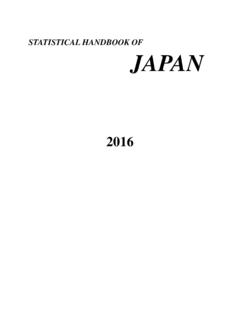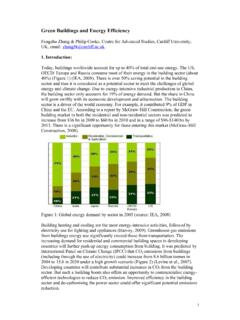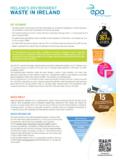Transcription of Korea Development Institute - OECD
1 Korea Development Institute Since its establishment in 1971 as the first government-supported social science research institution in Korea , Korea Development Institute (KDI) has endeavored to build up its reputation as Think Tank of Korea on economic policy and institutional reform studies. During the past three decades, the scope and focus of KDI researches have changed. Accordingly, in the 1970s, KDI proactively focused on policy issues related to the Five-year Economic Development Plans. Over the years, KDI has provided comprehensive research analyses and policy recommendations on the overall scope of the Korean economy, including macroeconomic outlook; money and finance; public finance and social welfare; industry, trade and labor; law and economics; and North Korean economy.
2 Moreover, in this globalizing age, the role of KDI has evolved in order to upgrade Korea s economic structure and institution to global standards as well as to find new dynamism of sustainable economic growth. Additionally, the non-research functions of KDI include activities of International Development Exchange Program, which involves sharing of the unique economic Development experience of Korea with various developing countries. The followings are the KDI s research activities conducted in 2002 and the research focus of 2003. I. Research Activities of 2002 1.
3 Macroeconomic Trends and Outlook The Division of Macroeconomic Policy at KDI releases KDI Quarterly Economic Outlook, in which the macroeconomic situation of the Korean economy is assessed and policy directions as well as short-term forecasts are provided. In addition to this quarterly publication, the Division uploads Monthly Review of Economic Trends on the KDI s homepage ( ) every month. 2. Economic Structural Changes and their Effects There are eight studies on this subject and the titles are as follows: 1) Transmission of Stock Price Movements from the to Korea : Towards an Understanding of the Mechanism and the Role of Foreign Investors 2) Usefulness of Business Survey Index(BSI) in Economic Forecasting 3) Determinants of Stock Market Participation Decision: The Case of Korean Households 4) Demand- and Supply-side Factors of Trade Balance Fluctuations in Korea : A Structural VAR Approach with Long-term Restriction 5) Internet Banking.
4 How Does It Change the Profitability and Competition Structures of the Banking Industry in Korea ? 6) Post-Crisis Growth and Bankruptcy Policy Reform in Korea : Empirical Evidence 7) The Effects of Employment Protection Deregulation on the Labor Market 8) Analyses on Changing Income Distribution and Income Redistribution Policy after the Economic Crisis in Korea 3. Mid- to Long-term Vision and Projection 1) Vision 2011: Open Society, Flexible Economy 2) Accounting for Economic Growth in Korea : 1963-2000 3) The Potential Growth Rate of the Korean Economy: 2003-2012 4. Establishing Inter-Korean Economic Community and Promoting Economic Cooperation in Northeast Asia 1) A Study on the Economic Development Strategy of North Korea 2) Monetary and Financial Integration of North and South Korea 3) Strategy and Tasks for Economic Cooperation among Korea , China and Japan 4) Analysis of the Laws Governing Gaesong Industrial District 5) On the Recent Banning of Dollars in North Korea 6) An Evaluation of North Korea s Economic Measures of July 2002 5.
5 Enhancing Efficiency of the Korean Financial Industry 1) The Regulation of Collective Investment Schemes in Transferable Securities: Comparative and Economic Analysis 2) Privatization Strategies for the Korean Financial Institutions 3) The Implication of Deposit Insurance Special Surcharge to Finance the Public Funds: Focusing on the Structure of Household Burden 4) Empirical Investigation on Economic Roles of Derivative Markets 5) On the Development of the Korean Futures Industry 6) Regulatory Systems on Financial Activities: Vision and Action Plans 6. Fiscal Sustainability and Soundness of Pension Funds 1) Policy Options to Strengthen the Fiscal Discipline 2) Post-Crisis Fiscal Issues and Policies 3) Direction of Tax Policy Towards Fiscal Sustainability 4) Macroeconomic Effects of the National Pension Scheme Reform 5) A Study on the Funding Rule for the Government Employees Pension Scheme 6) Efficient Management of Public Pension Funds 7.
6 Public Investment Management 1) Implementing Ex-Post Project Evaluations in Korea 2) Measures for Fiscal Management of Public Investment 3) Report on 2002 Preliminary Feasibility Studies 8. Competition Policy and Corporate Governance 1) The Effects of the Economic Crisis and Corporate Reform on the Korean Business Groups 2) Designing Incentive Mechanism for CEOs of Public Enterprises 3) Corporate Governance and Firm Profitability: Evidence from Korea before the Economic Crisis 4) Telecommunications Regulations in Korea : Evaluation and Future Policy Direction 5) An Empirical Examination of the Post-Crisis Corporate Bankruptcy System in Korea : Focusing on the Court-administered Bankruptcy System 6) Studies on Market Concentration in Korea s Manufacturing Industry 9.
7 Building up the Foundation of the Knowledge-based Economy 1) Evaluation of Technology Innovation Policy 2) Structural Changes in Research and Development Activities of Korea s Business Enterprises 3) Economics of Private Tutoring 4) A Change in Pollution Intensity and International Competitiveness: 1993-1998 II. Major Research Agenda of 2003 In line with the globalizing trends and fierce international competition faced by the Korean economy, KDI has selected following four major research topics in various fields for the year 2003: 1) Enhancing Korea s Industrial Dynamism, 2) Performance Evaluation of Corporate Restructuring, 3) Evaluation of Social Welfare System, and 4) Effects of Population Aging.
8 The title and background for each selected project are as follows: 1) Competitiveness of Korea in the Face of New Emerging Patterns of Industrial Dynamism in East Asia East Asia is experiencing rapid and profound changes in their industrial landscapes. Especially, the emergence of China as a new industrial power accelerates and adds significant complication to the ongoing process of region-wide industrial restructuring, deeply affecting all neighboring countries including Korea . Against this backdrop, the project aims to make a comprehensive empirical analysis on the changing patterns of industrial competitiveness in the East Asian economies including Korea , China, and Japan.
9 The overarching research question is how industries and businesses in this region are responding to, or coping with the changing economic environment. Furthermore, the strategy to maintain Korea s competitive advantage is urgent in light of the current economic situation and the focus would be to identify which sectors our growth factor should be drawn from, and what should be the policy priorities. 2) Performance Evaluation and Future Tasks of Corporate Restructuring The effective restructuring in the corporate sector is a prerequisite in preventing recurrence of financial crisis in time of global economic stagnation.
10 In this regard, KDI needs to make empirical evaluations over key success factors among various corporate restructuring measures that have been carried out since the financial crisis of 1997. In particular, after insolvent firms are categorized into court receivership, composition, and workout, the performance of each category will be compared to yield relevant factors for rehabilitation. 3) Evaluation and Task for Social Welfare System in Korea The history shows that social coherence is a prerequisite to maintaining economic growth. Given this premise, we first ask what must be the social welfare policies that protect the marginalized groups and determine whether these policies pose conflict with the policies on economic growth.
















